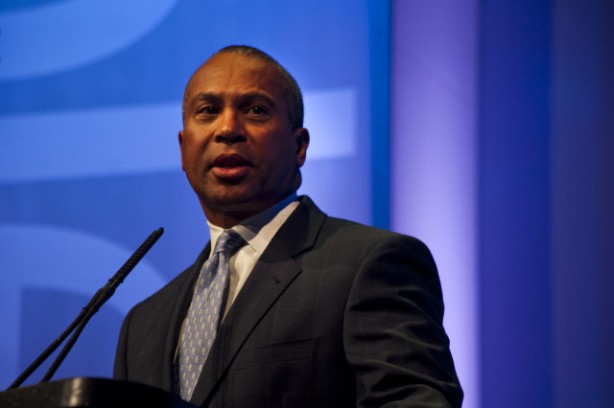(STATE HOUSE NEWS SERVICE) — As they grapple with budget problems in the dying days of the Patrick administration, aides to the governor are also busy trying to calculate an adjustment in the base pay for lawmakers. While most lawmakers receive additional pay associated with assignments given to them by legislative leaders, their base pay has fallen since 2009, a year when some lawmakers rejected a 5.6 percent pay raise or donated their raises to charity because the state was in the midst of painful budget cutting. Under the constitution, Patrick must rule by the first Wednesday in January of odd-numbered years – Wednesday, Jan. 7, 2015 – the day before Charlie Baker is sworn in as his successor, on the size of pay adjustments for the 200 members of the state Legislature. The constitution requires that the base compensation of lawmakers “be increased or decreased at the same rate as increases or decreases in the median household income for the commonwealth for the preceding two year period, as ascertained by the governor.” Administration officials declined to discuss their approach to the upcoming adjustment in legislative base pay, or the timing of their announcement, noting only that an adjustment must be made by the first Wednesday in January, or Jan. 7, 2015 Two years ago, Patrick cut the base pay of lawmakers by $1,100 to $60,033 based on median income information drawn from the U.S. Census Bureau’s American Community survey and other reports of average weekly wages in Massachusetts. Lawmakers also took a pay cut in January 2011 when the governor directed a reduction of one half of 1 percent, or $307, reducing the base salary to $61,133.
Rep. Garrett Bradley (D-Hingham) and former Rep. Karyn Polito (R-Shrewsbury), who is set to be sworn in as lieutenant governor on Jan. 8, were among lawmakers who rejected a $3,243, or 5.6 percent, raise in January 2009, when Patrick set the base salary at $61,440. At the time, Polito said money set aside for raises would be better spent on local aid increases and to offset toll increases.
According to research performed by a public compensation commission set up earlier this year, the average total pay for state legislators came to $73,175 in 2013, with lawmakers averaging $13,142 in special compensation on top of their $60,033 base salary. Each lawmaker receives $7,200 a year for expenses and is eligible for per idem payments for travel, ranging from $10 to $100 based on their proximity to Beacon Hill.
Voters agreed to tie legislators’ salaries to median household income through a 1998 constitutional amendment, which went into effect in 2001.
“However, the lack of timely median household income data has forced administrations to improvise when estimating the growth in income for the year preceding the start of each session,” according findings released by the public compensation commission. “As a result, there is no consistent method for determining the biennial change in legislative salaries.” Along with salary increases for constitutional officers and legislative leaders, the commission recommended in December the elimination of per diems, an increase in legislative office expenses, and a “totally transparent” way to determine legislators’ base salary. “Legislative pay has long been a source of controversy on Beacon Hill; before 1998, it was determined by lawmakers themselves,” the commission, chaired by former state revenue commissioner Ira Jackson, said in a preliminary report. “A public furor followed passage of the infamous ‘Halloween’ pay raise of 1980, when lawmakers approved a $1,800 pay raise during an Oct. 31 session.” That increase was later overturned through a referendum.
[Gintautas Dumcius contributed reporting.]
Patrick expected to adjust base pay of lawmakers

Nicolaus Czarnecki/Metro


















